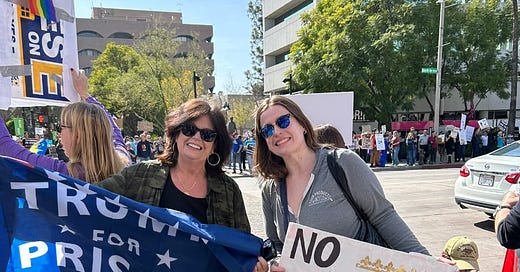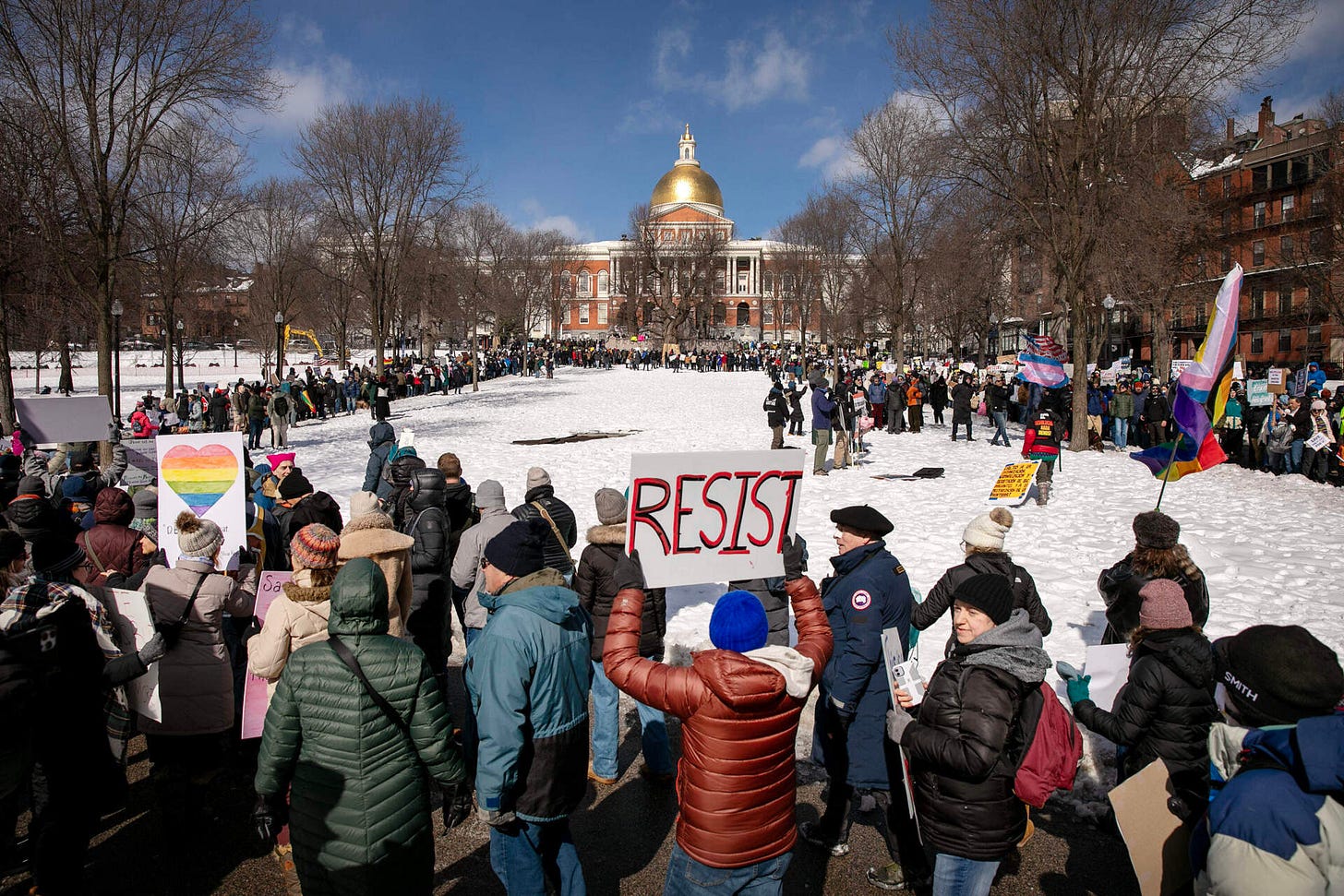It's Time To Get Off The Fence. Show Up. Stand Up. Speak Up.
We only have ONE King and WE are the troops He's sending into the cities. While others put their bodies on the line, what are you doing today that's more important than THIS?
1. You Can’t Sit This One Out
There comes a time when silence becomes complicity. When being “neutral” simply means staying comfortable while others suffer. For those of us who follow Jesus—the one who overturned tables and embraced the marginalized—it’s clear: this is not a time for passive belief. It’s time for embodied love.
No Kings Day isn’t just a protest. It’s a national call to wake up. To say, “We are not subjects of an earth-bound king.” As citizens of God’s Kingdom, we serve the only King who traded power for sacrifice, and who calls us to do the same.
We reject authoritarian rule of any party or personality, and stand instead for the freedom and flourishing of every image-bearer of God.
So if you’ve been sitting on the fence, ask yourself: What Kingdom work are you doing today that’s more important than this?
Because when you stay home, someone else carries your convictions into the street. Someone else risks being misunderstood, misquoted, maybe even harmed, for the values you claim to hold dear.
They’re showing up, standing up, speaking up. Will you?
They’re present. Will you be?
Find your closest event here: https://www.mobilize.us/nokings/
(https://www.ibtimes.sg/massive-no-kings-day-protests-erupt-across-usa-against-donald-trumps-executive-overreach-78558?utm_source=chatgpt.com)
The Power of 3.5%: Why Peaceful Protest Works
Peaceful protest works. Political scientist Erica Chenoweth’s research found that nonviolent campaigns involving just 3.5% of a population have never failed to bring about major social or political change. (1)
In the U.S., that’s just 11 million people. That’s fewer than the population of Ohio. It’s the equivalent of one in thirty Americans standing up, stepping out, and saying, “No more.”
The point isn’t just numbers. It’s the tipping point where presence becomes pressure. When bodies in the street speak louder than voices online. When love shows up.
And guess what? When people of faith take part in those numbers, rooted not in rage but in righteousness, something changes. Not just laws, but hearts. We become, together, the conscience of a nation.
(“Hundreds gather in Boston for ‘No Kings on Presidents Day’ protest. https://www.wbur.org/news/2025/02/17/boston-50501-presidents-day-protest)
We’ve Done This Before: A Christian Legacy of Resistance
Christian history is full of faithful resistance, not rooted in anger, but in love for neighbor and allegiance to Christ.
Dietrich Bonhoeffer, a German pastor, opposed Hitler’s regime with both his words and his life. Grounded in the confession “Jesus is Lord,” Bonhoeffer was executed for his role in a plot to stop Nazi atrocities, leaving behind a theology of costly discipleship. (1906–1945)
Dr. Martin Luther King Jr., shaped by Jesus’ Sermon on the Mount and inspired by Gandhi, led the American Civil Rights Movement through marches, speeches, and sit-ins rooted in nonviolence. His work changed laws and transformed hearts. (1929–1968; most active 1955–1968)
Rev. James Lawson Jr., a lesser-known but pivotal figure, brought Gandhi’s philosophy to the U.S. and trained civil-rights leaders like John Lewis and Diane Nash. His workshops on nonviolence fueled desegregation efforts across the South. (Born 1928; Nashville sit-ins circa 1959–1960)
Archbishop Desmond Tutu, with prophetic clarity, condemned apartheid in South Africa. Refusing to hate, he proclaimed, “If you are neutral in situations of injustice, you have chosen the side of the oppressor.” His leadership helped dismantle apartheid without civil war. (1931–2021; active especially 1980s–1994)
Harriet Tubman, known as “Moses,” escaped slavery and then returned to free others, trusting in God with every journey. Her fearless acts of liberation were deeply rooted in her Christian faith. (c. 1822–1913; active especially 1850–1860)
The Women of Liberia Mass Action for Peace, led by Christian social worker Leymah Gbowee, ended a brutal civil war in 2003 through prayer, nonviolent protest, and relentless persistence. Their courage helped usher in peace, and Africa’s first female president. (2003)
William Wilberforce, a British Member of Parliament, labored for decades to abolish the transatlantic slave trade. Fueled by deep Christian conviction, he fought systemic evil until the trade was outlawed. (1759–1833; slave trade abolished in 1807, slavery in 1833)
They didn’t wait for conditions to be perfect. They showed up when it was hard. They stood up when it was dangerous. And they remind us: this isn’t political. It’s biblical.
Jesus: The First Nonviolent Revolutionary
Jesus never wielded a sword, but He was never passive. His way of confronting injustice was bold, disruptive, and deeply grounded in love:
In Matthew 21, He overturns the tables of the money changers, calling people to honor God while challenging economic oppression at the very heart of religious power.
In Matthew 5, He teaches, “If anyone strikes you on the right cheek, turn the other also.” Far from passive submission, this was a strategic act of dignity and defiance, disarming the oppressor without mirroring their violence.
In Luke 4, His first public words declare liberation for the oppressed and good news for the poor. This is not quiet spirituality; it is public resistance.
He tells His followers to “take up their cross daily” (Luke 9:23), a call to risk everything for righteousness, even in the face of empire.
He rebukes Peter for drawing a sword in the garden (Matthew 26:52) and heals the wounded enemy, modeling a love that goes beyond defense to transformation.
He didn't flinch at power. He challenged it with love. That’s our model.
Leading with Humility—and Courage
There’s a tension every faithful leader must hold: How do we walk in humility, while standing firm against evil? Scripture doesn't leave us guessing.
In 1 Peter 5, the apostle opens with a tender exhortation to “shepherd the flock of God that is among you, not domineering over those in your charge, but being examples.” He calls leaders to clothe themselves with humility because “God opposes the proud but gives grace to the humble.”
But Peter doesn’t stop there.
Just a few verses later, he writes with equal urgency: “Be alert and of sober mind. Your enemy the devil prowls around like a roaring lion looking for someone to devour. Resist him, standing firm in the faith” (v. 8–9).
Humility is not passivity. A true shepherd both tends the sheep and confronts the wolf.
We are called to this same paradox: lead with a gentle spirit, but also a resolute spine. Our courage must be meek—strength under control. Our resistance must be rooted, not in partisanship, but in the unshakeable justice of God.
Proverbs 31:8–9 urges us to “Speak up for those who cannot speak for themselves... defend the rights of the poor and needy.”
Micah 6:8 reminds us: “What does the Lord require of you? To act justly and to love mercy and to walk humbly with your God.”
Christian leaders—and Christian citizens—must be formed by both the cross and the courage of Christ. We don’t shout. We don’t shrink. We show up. Grounded in God’s love, unafraid to speak truth with tenderness.
(“Millions in US expected to join ‘No Kings’ protests against Trump.” “Protestors outside Fox News in New York City on 3 June 2025.” The Guardian. https://www.theguardian.com/us-news/2025/jun/13/no-kings-protests)
A Word to Leaders: For Such a Time as This
If you are in a position of influence—pastor, coach, teacher, mentor—your silence speaks louder than you think.
You may worry that speaking out will alienate people you love. That you'll close doors you’ve worked hard to keep open. But Scripture reminds us: perhaps you were given this position for such a time as this (Esther 4:14).
Yes, some will misunderstand. You’ll say things they hear as “political,” even if what you’re actually saying is deeply biblical. You’ll stand for the marginalized, speak against tyranny—especially when it masquerades as righteousness—and someone will accuse you of “dividing the Church.”
But remember Jesus. He called out leaders who burdened the people but didn’t lift a finger to help them (Luke 11:46). He wept over the city of Jerusalem that missed the path to peace. He overturned tables. He told hard truths, not to shame but to save. And He never sacrificed the vulnerable to preserve appearances.
You may lose a few “followers.” But they’re still watching. You’re planting seeds in their minds, even if the soil isn’t ready yet. They look to you. They admire you… even if they disagree. And your boldness might just open their eyes one day.
So ask God: Is this the moment to use my voice? My body? My presence?
Because history changes when people like you step off the fence and into the story.
You Are Needed: Show Up, Peacefully
Movements don’t happen in theory. They happen in the streets. (Click here to find a “No Kings” protest near you.)
We’re not asking for your outrage. We’re asking for your presence.
On No Kings Day, peaceful protests are taking place in cities across the U.S. Not in anger, but in hope. Not to tear down, but to remind our leaders: we are not subjects. We are citizens. Created in the image of God. Equal, beloved, free.
When 3.5% of the population shows up, history turns. But that number isn’t magic. It’s made up of real people. People like you.
So bring your voice. Bring your prayers. Bring your body. Bring your faith.
Pray With Us
Before you march, pray. During the protest, pray. After, pray again. Here’s a simple liturgy to guide you:
Leader: Lord of justice and peace,
All: Give us courage to stand and humility to kneel.
Leader: You call us to act justly, love mercy, and walk humbly.
All: May we follow You, even when the road is costly.
Leader: In the face of fear and power,
All: We will not be silent. We will not be violent. We will follow You.
Amen.
Final Charge: Bold, Humble, Holy
The world does not need louder voices. It needs clearer hearts.
This is not about left or right. This is about light. The light that shines in the darkness, and the darkness has not overcome it.
As Christians, we do not protest because we are angry. We protest because we are loved… and because we love. We resist evil, not with hate, but with hope. We stand as servants of the One King who wore a crown of thorns.
So don’t sit this one out. Join the movement. March in peace. And may your presence be a witness—bold, humble, and holy.
Once more: Click here to find a protest near you.
1 - See Erica Chenoweth and Maria J. Stephan,Why Civil Resistance Works: The Strategic Logic of Nonviolent Conflict(Columbia University Press, 2011). Their research shows that nonviolent movements engaging at least 3.5% of a population have never failed to achieve major change. Summarized in Chenoweth’s 2013 TEDxBoulder talk and BBC Future, “The ‘3.5% rule’: How a small minority can change the world.”






